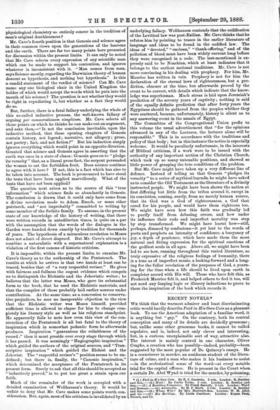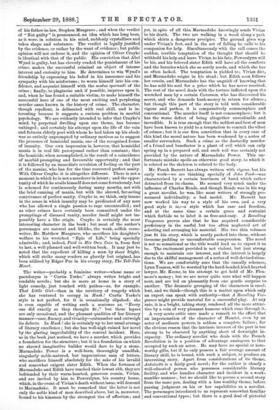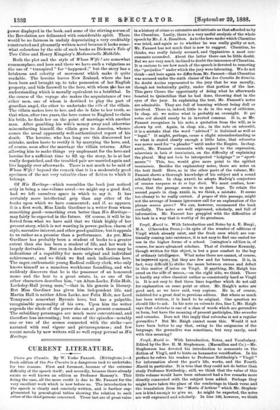RECENT NOVELS.*
WE think that the warmest admirer and least discriminating critic would hardly describe Paid in His Own Coin as a pleasant- book. To use the American adaptation of a familiar word, it is anything but " gay." On the contrary,, both its central conception and many of its details are decidedly gruesome ; but, unlike some other gruesome books, it cannot be called repulsive, and is, indeed, not only clever and interesting, but, in a curious, unexplainable sort of way, attractive also. The interest is mainly centred in one character, Oliver Crayke, a creation who has possibly—indeed, probably—been suggested by the most popular of De Quincey's essays. He is a connoisseur in murder, an assiduous student of the litera- ture of crime, and a man who makes it his business to assist —in the ecclesiastical sense of the word—at every notable trial for the capital offence. He is present in the Court when.. a certain Dr. Abel Wynd is tried for the murder, by poisoning,
• (1) Paid in .11a Own Coin. By 5..7. Goodwin. 3 rob. London : R..Bentley and Son.—(2.) Hush ! By Curtis Yorke. 3 vols. London R. Bentley and Son.—(S) A. Recoiling Vengeance. By Frank Barrett, 2 yob London: Ward and Downey.—(4.) Antoinette. By M. P. Blyth. 2 yob. London: R. Bentley and Bon.—(5.) Whose Wife? By Mrs. Harcourt-Roe. London : W. H. Allen and Co —(6 ) His Heritage. By Linda Gardiner. London : Regan Paul, Trench, and Co.
of his father-in-law, Stephen Musgrave ; and when the verdict of "Not guilty" is pronounced, an idea which has long been, as it were, in solution in his mind, suddenly crystallises and takes shape and substance. The verdict is legally justified by the evidence, or rather by the want of evidence ; but public opinion will not endorse it, and the opinion of Oliver Crayke is identical with that of the public. His conviction that Abel Wynd is guilty, but has cleverly evaded the punishment of his crime, makes the successful criminal an object of intense interest and curiosity to him. He determines to win Wynd's friendship by expressing his belief in his innocence and his sympathy with his misfortune ; to worm himself into his con- fidence, and acquaint himself with the modus operandi of the crime ; finally, to plagiarise and, if possible, improve upon it, and, when he has found a suitable victim, to make himself the successful hero of one of the most exciting and perplexing murder cases known in the history of crime. The character, though repellent, is delineated with real skill, and is in- teresting because it suggests a curious problem in morbid psychology. We are evidently intended to infer that Cmyke's mind, by perpetual dwelling upon one theme, has become unhinged ; and certainly his attempt upon the life of the vain and fatuous elderly poet with whom he had taken up his abode was so entirely unprompted by ordinary motives as to suggest the presence of homicidal mania, one of the recognised forms of insanity. Our own impression is, however, that homicidal mania is in real life paroxysmal rather than constant; that the homicide, when accomplished, is the result of a coincidence of morbid prompting and favourable opportunity ; and that it is followed by an immediate revulsion of feeling on the part of the maniac, who has for the time recovered perfect sanity. With Oliver Crayke it is altogether different. There is not a moment in which he is not a murderer in intent ; and the oppor- tunity of which he avails himself does not come fortuitously, but is schemed for continuously during many months, not with the brief cunning of mania, but with the shrewd, far-seeing contrivance of perfect sanity. Crayke is, we think, only insane in the sense in which insanity may be predicated of any man who has allowed a single passion to rage uncontrolled ; and as other crimes have certainly been committed under the promptings of diseased vanity, murder itself might not im- possibly have a like origin. Crayke is certainly the most interesting character in the book ; but most of the author's personages are natural and lifelike, the weak, selfish verse- writer, Mr. Matthew Musgrave, who sacrifices his daughter's welfare to his wretched " Epic of Life," being specially admirable; and, indeed, Paid in His Own. Coin is, from first to last, a well-planned and well-written book.. It may just be noted that the expedient of killing a man Iv sheer fright, which will strike many readers as ghastly but original, ..bas been utilised by Edgar Poe in his creepy story, The Tell-Tale Heart.
The writer—probably a feminine writer—whose name or pseudonym is " Curtis Yorke," always writes bright and readable novels ; but she is more at home in a story of light comedy, just touched with pathos—as, for example, That Little Girt—than in the territory of tragedy which she has ventured to occupy in Hush ! Curtis Yorke's style is not perfect, for it is occasionally slipshod; she is even capable of writing such a sentence as, "Every one did exactly as they thought fit ;" but these lapses are only occasional, and the pleasant qualities of her literary manner—ease, fluency, and vivacity—outnumber and outweigh its defects. In Hush ! she is' certainly up to her usual average of literary excellence ; but she has well-nigh ruined her novel by the glaring improbability of the central incident. Here, as in the book just noticed, we have a murder, which provides a foundation for the structure ; but it is a foundation on which no shrewd imaginative builder would dare to lay a stone. Marmaduke Power is a well-born, thoroughly unselfish, singularly noble-natured, but impecunious man of letters, who sacrifices himself absolutely for the sake of his invalid and somewhat exigent sister Edith. When the fortunes of Marmaduke and Edith have reached their lowest ebb, they are befriended by their warm-hearted, generous cousin, Vivian, and are invited by him to Poweralynn, his country house, which, in the event of Vivian's death without issue, will descend to Marmaduke. It must be remarked that the latter is not only the noble kind of man described above, but is, moreover, bound to his kinsman by the strongest ties of affection ; and yet, in spite of all this, Marmaduke knowingly sends Vivian to his death. The two are walking in a wood along a path which skirts a dangerous precipice. The ground gives way under Vivian's feet, and in the act of falling he calls to his companion for help. Simultaneously with the call comes the sudden, terrible temptation of the thought that should he withhold his help and leave Vivian to his fate, Powerslynn will be his, and his beloved sister Edith will have all the comforts and the luxuries which she so sorely needs, and which she has so often lacked. The temptation is yielded to ; Vivian dier, and Marmaduke reigns in his stead ; but Edith soon follows her cousin, and Marmaduke has the anguish of knowing that he has sold his soul for a price which he has never received. The rest of the novel deals with the torture inflicted upon tie wretched man by a certain Caverson, who has discovered his secret, and who demands hush-money in return for silence ; but though this part of the story is told with considerable vigour and pathos, it is comparatively commonplace and conventional. The murder itself is not commonplace; but it has the worse defect of being altogether unrealisable and incredible. It is true enough that the noblest and best of men have been known to yield to a temptation to commit the vilest of crimes ; but it is our firm conviction that in every case of this kind the moral nature has been weakened by a series of smaller surrenders. Such a crime as the dastardly murder of a friend and benefactor is a plant of evil which can only spring up in a prepared soil, and such soil was certainly not provided by the nature of Marmaduke Power. This un- fortunate mistake spoils an otherwise good story, to which it is related as the skeleton is related to the body.
Mr. Frank Barrett has always written with vigour, but his early work—we are thinking specially of John Ford—was characterised by a certain heaviness of hand which rather detracted from its charm. He seemed very much under the influence of Charles Reade, and though Reade was in his way a great novelist, he was, like most writers of strongly pro- nounced individuality, a bad model. Mr. Barrett has now worked his way to a style of his own, and a very good style it is,—a style which has ease and freedom, and at the same time a certain grace and restraint which forbids us to label it as free-and-easy. A Recoiling Vengeance proves also that he has acquired considerable proficiency in the useful but too often neglected art of selecting and arranging his material. His two thin volumes just fit his story, which is neatly packed into them, without tiresome padding or uncomfortable compression. The novel is not so sensational as the title would lead us to expect it to be. The excitement provided is not violent, but just strong enough to maintain our interest, and the interest is largely due to the skilful management of a series of well-devised situa- tions. We are comfortably sure that the rascally schemer, Lynn Yeames, will be worsted by the hard-headed, kind-hearted lawyer, Mr. Keene, in his attempt to get hold of Mr. Flex- more's money ; but we are never quite sure what will happen next, and are led on pleasantly from one gentle surprise to another. The dramatic grouping of the characters is excel- lent, and we think—though this is a matter upon which only an expert can speak with authority—that A Recoiling Ven- geance might provide material for a successful play. At any rate, it is a bright, taking story, rendered all the more attrac- tive by a vein of very pleasant humour which runs through it.
A very acute critic once made a remark to the effect that an impersonation of the character of Hamlet, even by an actor of mediocre powers, is seldom a complete failure ; for the obvious reason that the intrinsic interest of the part is too strong to be obscured by anything short of downright in- capacity. The ordinary novelist who deals with the French Revolution is in a position of advantage analogous to that occupied by such an actor. He may have no special or note- worthy gifts, but if he only possess a fair average amount of literary skill, he is bound, with such a subject, to produce an interesting story. Apart from considerations of its theme, Antoinette is a fairly good novel; for the author is clearly a well-educated person who possesses considerable literary facility, and who handles character and incident in a work- manlike manner ; but we should like to peruse a second story from the same pen, dealing with a less wealthy theme, before passing judgment on his or her capabilities as a novelist. The personages introduced to us represent somewhat familiar and conventional types ; but there is a good deal of pictorial power displayed in the book, and some of the stirring scenes of the Revolution are delineated with considerable spirit. There
would be no fairness in unduly depreciating a very creditably constructed and pleasantly written novel because it looks some- what colourless by the side of such books as Dickens's Tale of Two Cities and Henry Kingsley's Mademoiselle Mathilde.
Both the plot and the style of Whose Wife ? are somewhat commonplace, and here and there we have such a vulgarism as the use of "transpired " for " happened ;" but the story has a briskness and celerity of movement which make it quite readable. The heroine leaves New Zealand, where she has been born and brought up, to take possession of her English _property, and bids farewell to the hero, with whom she has an understanding which is morally equivalent to a betrothal. In the course of the voyage she makes the acquaintance of two 'other men, one of whom is destined to play the part of guardian angel, the other to undertake the role of the villain The villain makes love to her, and she is false to her troth, so that when, after two years, the hero comes to England to claim his bride, he finds her on the point of marriage with another man. After gambling his wife's money away and otherwise misconducting himielf, the villain goes to America, whence comes the usual apparently well-authenticated report of his death. The heroine, who has long ere this discovered her mistake, makes haste to rectify it by marrying the hero, and, of course, soon after the marriage the villain returns. After .allowing him to make things ery unpleasant for the hero and heroine for a sufficient time to fill up the story, he is at last really despatched, and the troubled pair are married again and live happily ever afterwards. There is not much to be said of Whose Wife? beyond the remark that it is a moderately good specimen of the not very valuable class of fiction to which it belongs.
Of His Heritage—which resembles the book just noticed only in being a one-volume novel—we might say a good deal, had we left ourselves space in which to say it. It has certainly more intellectual grip than any other of the books upon which we have commented ; and if, as appears, it is a first work, Miss Linda Gardiner is a writer from whom .something good—something even better than His Heritage— may fairly be expected in the future. Of course, it will be in- ferred from what we have said that we think highly of her present story, which is not wanting in power, pathos, charm of style, narrative interest, and other good qualities; but it appeals to us rather as a promise than a performance. As yet, Miss Gardiner has probably been a student of books to a greater extent than she has been a student of life, and her work is largely derivative. But even in derivative work there may be indications of a capability for more original and individual achievement; and we think we find such indications here. The eager, enthusiastic young Radical colliery clerk, who only -knows himself as a nameless workhouse foundling, and who suddenly discovers that he is the possessor of an honoured name and the heir to a great estate, is, as one of the other characters describes him, an Alton-Locke, Felix-Holt, iocksley-Hall young man,"—that is, his genesis is literary. Mut Miss Gardiner has given him independent life, and Martin Hall is neither Alton Locke, nor Felix Holt, nor Lord -Tennyson's somewhat Byronic hero, but has a palpable, -recognisable personality of his own. Upon him the writer expends the whole of the power she can at present command. The subsidiary personages are much more conventional, and therefore less interesting; but some of the episodes—notably .one or two of the scenes connected with the strike—are narrated with real vigour and picturesqueness ; and few recent novels by new writers will so well repay perusal as His Heritage.








































 Previous page
Previous page